The military can be really challenging because it’s something far away from what we’ve been used to. Some people are overwhelmed by the experience. … Everybody has their own small challenges. Everybody has their demons they have to fight.
I was reminded of these words—spoken by a member of the African Hebrew Israelite community, who served in the Israel Defense Forces from 2009 to 2012 and whom I interviewed last year—when I learned about the tragic death of Toveet Radcliffe.
A 19-year-old corporal in the Air Force, Radcliffe died on Palmachim Air Force Base near Yavne on February 22, reportedly from a self-inflicted gunshot wound. She was the first Hebrew soldier to fall in the line of duty. Her death occurred just as the IDF was launching a social media campaign—hashtag #IDFDiversityWeek—highlighting soldiers like her from minority communities.
Those who knew Radcliffe best are convinced that she didn’t kill herself. They want to know why IDF officers initially told her family that she was found dead in her bed on the base and then later told them a different story, saying that she shot herself in the head while doing guard duty and that her body was discovered in the guard tower by the soldier coming to relieve her at the end of her shift. They are also upset that no major Israeli news outlet reported on her death and that the IDF initially identified her as a man on its memorial website (the error has since been corrected).
In a statement released to the press on February 24, the Hebrew community called for a thorough and honest investigation of her death. “We are certain that the investigators are aware that our heart is in their hands and that they know to handle it properly,” they wrote. A month later, Radcliffe’s family and community are still waiting for answers. (An IDF spokesperson told me it can take up to two months to complete such an investigation.)
The death of a young person is always heartbreaking and difficult to process. For the Hebrews, Radcliffe’s death has been especially hard to accept, given the unanswered questions, her youth and beauty, and the timing—coming less than two months after their spiritual leader and messiah, Ben Ammi Ben Israel, passed away from an undisclosed illness. And while they enjoy legal status in Israel today, their distrust of the Israeli government—a byproduct of more than 30 years of conflict over their right to settle in the country—has never entirely dissipated. Given this history, and in the absence of hard information, rumors have been flying in Dimona and online.
I did not know Radcliffe, and I won’t speculate about what happened to her as other outside observers have done (irresponsibly, I believe). But I do want to share some of what I’ve learned from the dozens of interviews that I’ve conduced over the years with Hebrew soldiers. I hope this post will shed some light on how challenging army service can be for these young people, and on how much more the IDF can and should do to help them acclimate to life in the army.
***
First, some background. The community’s high school graduates have been drafted into the IDF since 2004, a year after the Interior Ministry granted most members permanent residency status. (Permanent residents, like most citizens, are obligated to serve in the army.) On the day that the first Hebrew soldier was inducted, Ben Ammi told the press: “This is an historic day of great joy. From now on we will be an inseparable part of Israeli society. Until now, other people sent their kids to protect us. Now it’s time for us to pay our debt.” More than 200 Hebrews have served to date in a variety of units, and two young men have achieved the rank of katzin, or officer (click here to read a profile of one of the officers, Etai Ben Israel).
As one of the IDF’s recognized “special populations,” Hebrew soldiers receive privileges intended to make their service more manageable. For example, they are exempt from active duty on Shabbat and holy days. As vegans, they are eligible to receive extra salary (500-600 NIS per month) and can request non-leather boots. Some individual male soldiers have also managed to get exemptions from shaving their heads and beards because doing so would violate Hebrew customs.
The community is proud of its involvement in the IDF and honors its soldiers in big and small ways; they are paraded about during New World Passover celebrations and eat for free at the community’s vegan restaurant in Tel Aviv. Yet for the Hebrews, as for other ethnic and religious minorities in Israel, serving in the army has proved to be a double-edged sword.
On the one hand, they gain useful skills their elders lack, such as Hebrew fluency and greater facility and confidence navigating mainstream Israeli society. In addition, they are entitled to Israeli citizenship for themselves and their parents, if they choose to apply for it. Yet as pacifists and vegans who fast every Shabbat, their service violates some of their core beliefs and tests their commitment to their community’s strict cultural guidelines. Moreover, after 11 years of helping to defend the country, they are still economically and socially marginalized. This is primarily due to the fact that they are not Jewish, since Jewishness is the key to full membership in Israeli society. It also has to do with the fact that they are largely uninterested in assimilating into a society whose liberal, Western values they do not share.
When I asked Sar Ahdeev Ben Yehuda, a community spokesperson, in an interview last year how community leaders reconcile the youth’s service in the IDF with their worldview, he replied: “We are sons of peace, and that’s a part of our vision, that we have harmony in society, peace, and love and brotherhood. But given the current realities and circumstances, we try to make our soldiers understand that there’s things that we have to go through that may not necessarily be part of our vision.”
He added that the youth are not encouraged to join combat units, though they can and have, if not without controversy. (The community’s former international ambassador, Asiel Ben Israel, publicly rebuked Ben Ammi for allowing the youth to serve in combat units.) Instead, Sar Ahdeev said, they are taught that they are to be “a spiritual element in the army that would help to reinforce the IDF.”
***
Between 2010 and 2014, I interviewed about 30 African Hebrew Israelite soldiers during and/or after their service as part of my ethnographic research on the Hebrew community. Each soldier had a unique story. Some relished the experience, bonding with their comrades and excelling at their jobs. Others hated everything about the army, calling it a waste of time and saying that they wouldn’t have served if they weren’t required to do so. A few spent time in jail. The success of their service often hinged on their own attitude and ability to cope with the daily stresses of military life. In this way, they were just like all the other soldiers.
Yet, I would learn, Hebrew soldiers face serious physical, emotional and psychological challenges that soldiers from other cultural or socioeconomic backgrounds typically do not. And, too often, their superiors prove to be unable or unwilling to help them overcome those challenges—either because they lack expertise or maturity (commanders are often only a year or two older than the soldiers under them), they want to avoid the appearance of favoritism, or possibly for more objectionable reasons.
Below is a summary of the soldiers’ struggles. I’m withholding their names to protect their privacy.
Culture shock
Most of the soldiers I interviewed said they experienced “culture shock” when they started basic training. “Before the army, I didn’t have any Israeli friends,” said Y., who drafted in 2009. “It was just us [Hebrews]; we were raised inside of a bubble.” In the army, he said, “it was like I was being opened to another world, another society.”
A., another 2009 draftee, said: “When I first got in, I hated it. Being with a bunch of people I didn’t know, crowded together in the same room, and then you had to take showers with all these people. That’s something I wasn’t used to.”
[su_youtube url=”https://www.youtube.com/watch?v=9aZvcqw3B7Y” width=”640″ height=”360″]The Day of the Show of Stength[/su_youtube]
Young African Hebrew Israelites discuss their IDF service in these excerpts from the 2014 documentary “Village of Peace,” directed by Niko Philipides and Ben Schuder.
Since the Hebrews are still relatively new to the IDF, they tend to be less prepared for the rigors of military life than their Israeli peers. “Most of the Israelis, they got brothers that tell them about the army, you can do this, you can’t do that,” Z. (2005) told me. “We had to experience that ourselves. It was a test, to see how you’re going to do if you ain’t got your parents by your side. You’re out there on your own.”
Racism
Many soldiers reported that they were the only Hebrews—and sometimes the only black people—on their bases and that they encountered racism in various forms. L. (2009) said his unit commander called him “kushi,” a derogatory word for blacks, at morning roll call because he was not dressed properly. The soldier was so incensed that he slapped the commander and was sentenced to three weeks in military jail. The commander was also disciplined, L. said.
N. (2009) was singled out by his commander to sweep and clean bathrooms on his base. He recalled: “I went up to him and was like, there’s something about me you don’t like. Let’s sit down and talk about it. He’s like, ‘No, I’ve got nothing to say to you, kushi.’ I was like, whoa, this is my commander, and he’s taught to relate to all his soldiers and try to avoid confrontation with them.” The soldier said he lodged a formal complaint over the incident, and his commander was moved to another platoon.
E. (2005) said he was shocked when the officer teaching one of his courses told the soldiers, “Al ta’avod c’mo nigger” (“Don’t work like a nigger”). E. said he approached the officer privately and told him that he found the expression offensive. The officer replied that he didn’t realize it was hurtful, that he was simply accustomed to using it. He did not say it again in E.’s presence, though.
Lack of access to vegan food
Although veganism has caught on in Israel in recent years, some Hebrew soldiers complained that the vegan options in the dining halls on their bases were very limited. R. (2009) recounted: “Basically there was only salad for you to eat, and when my parents sent me food they didn’t want to put it in the refrigerator. They said it’s ‘special privileges,’ so I had to go off on them about that. I have to eat just like everybody else.” She said her commander told her that she was not familiar with the Hebrew community and asked her why she was being so difficult. “We went back and forth all the time,” she said.
When M. (2011) told her commander that she couldn’t eat in the cafeteria because the smell made her sick, the commander sent her a box of cucumbers and tomatoes. “I was like, ‘Are y’all crazy?’” she said. “After that, when I went home, I made a lot of food and I brought it to the base and they stored it for me in the kitchen.” However, “that became a problem because the rabbi decided it wasn’t kosher.” M. left the base a week later upon completing her training.
The situation was more serious for D. (2012), who collapsed in her room halfway through the first week of basic training because she had been avoiding the dining hall—“the smell was terrible and it wasn’t clean”—and subsisting on bread and jam. “They weren’t prepared to have a vegan on the base,” she said. “My body just couldn’t take it anymore.” She said she was transported by ambulance to a hospital, received two blood transfusions and was bed-ridden for three months. When she returned to the army, she received permission to keep food in a refrigerator in her room.
Lack of familiarity with Hebrew soldiers’ privileges
As noted above, Hebrews soldiers are supposed to receive certain privileges as members of a “special population.” But some soldiers told me that their superiors were unaware of their privileges and/or unwilling to grant them. This was a major source of frustration. As one soldier put it: “In the army it’s hard to readjust to that system, especially if you don’t have a commander that cooperates with you, even on the smallest things.”
For example, N. (2009, quoted above) was sentenced to 28 days on base for refusing an order to drive on Shabbat. (Like Jews, Hebrews refrain from working and using electricity on Shabbat.) According to IDF guidelines, Hebrew soldiers who request a ptor, or exemption, from active duty on Shabbat and Holy Days are to be granted one automatically.
B. (2011) was brought before a military judge for refusing to crop his hair, which is required of all male soldiers. “I told him that my hair is part of my physical and mental strength and part of my connection with Yah,” he said. Officially, Hebrew soldiers are not exempt from cutting their hair; however, this soldier said the judge found him not guilty on religious grounds. Later, he was told that he would not be able to participate in an officer’s training course unless he cut his hair. He agonized over the decision and finally went to see the barber. He recalled: “My spirit wasn’t right for that first week. I was messed up. I think that was the hardest part of the course.”
L. (2009, quoted above) was moved to another base after refusing to sign a form forfeiting his status as a vegan soldier—and the extra salary that comes with it—because he chose to wear leather boots. “We’re vegans because of health reasons, so the leather boots are not that big of a deal,” he said. “After arguing with the commander for forever, I told him I’m not going to sign so he ended up moving me, basically over boots.”
Financial difficulties
The IDF offers financial aid to needy soldiers, but the application process involves home visits and lots of paperwork. K. (2009) said the process dragged on for months and that he did not receive the aid that he needed. “My family was struggling; my mother was sick,” he said, noting that he was the head of his household during his service and had to juggle the army and his familial responsibilities. “I just felt like, as a soldier, I should have gotten more help.” In an unusual display of compassion, K.’s superiors gave him money out of their own pockets from time to time and allowed him to leave his base early so he could work a job.
R. (2009; quoted above) appealed to her commander for housing, explaining that she did not have her own bed at her parent’s crowded house in Dimona. The commander did not follow through. “They’re supposed to check if you need something in your home, if your parents need help,” she said. “At the time, I was sleeping on the couch and I told them this. They were supposed to help me get housing, but they didn’t help with anything.” She added: “I could have been a good soldier if they had treated me right.”
Identity issues
A few soldiers described problems that arose due to their outsider status as non-Jews without Israeli citizenship. T. (2009) served in a unit that handled sensitive communications but was removed after a year because, her commander told her, she did not hold Israeli citizenship. “They told me something was wrong with my [security clearance] and that I had to leave the room,” she said. “It was terrible because I was supposed to become a commander and it happened right during the process. It was embarrassing.” After that, she said, “I didn’t have a job in the army so I was just coming to the base every day doing nothing.”
M. (2011; quoted above) dreamed of being a combat soldier but decided against it after learning that Jewish soldiers and non-Jewish soldiers who fall in the line of duty are buried separately. She said: “It got to me big time. Just to know the fact that I’m good enough to fight, but at the end of the day this country don’t give a damn about me.”
***
Apparently, Toveet Radcliffe also had a difficult time adjusting to the army. One friend and fellow soldier who served on Palmachim with her told me in a phone interview that she looked “very depressed and worried” when she arrived on the base in January. The friend said: “When we saw each other, she gave me a hug and she just held me so long and so tight. She said, ‘I’m so happy to have someone I recognize and I can talk to.’”
According to the friend, Radcliffe moved constantly from base to base and seemed lonely on Palmachim but returned to her normal, cheerful self on weekends in Dimona. She had failed to report for duty for several days prior to the weekend she died; her commander finally came to her house and escorted her back to the base. “There was something going on in her unit that was bothering her,” the friend said.
If the IDF really is a “people’s army,” if it truly prizes the diversity of its troops as it claims to, then the top brass must do more to accommodate the needs of African Hebrew Israelite soldiers—just as it has done for Ethiopian soldiers, who experience similar types of discrimination and feelings of isolation. And it must produce a full account of what happened to Radcliffe and take steps to prevent another tragedy like this one from occurring in the future.
I encourage current and former soldiers from the community to share their reactions and personal experiences in the IDF in the comments section below.

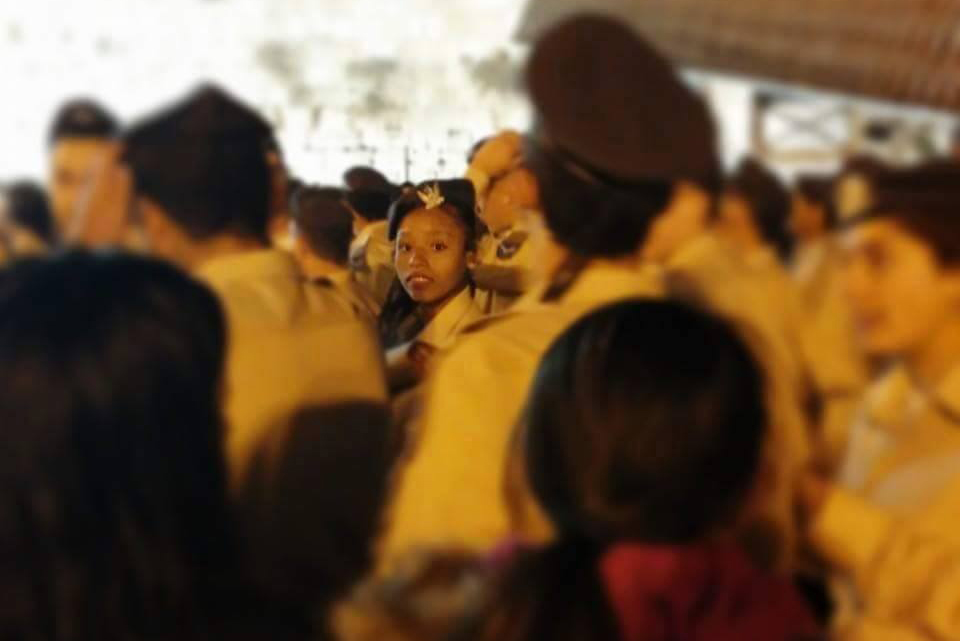
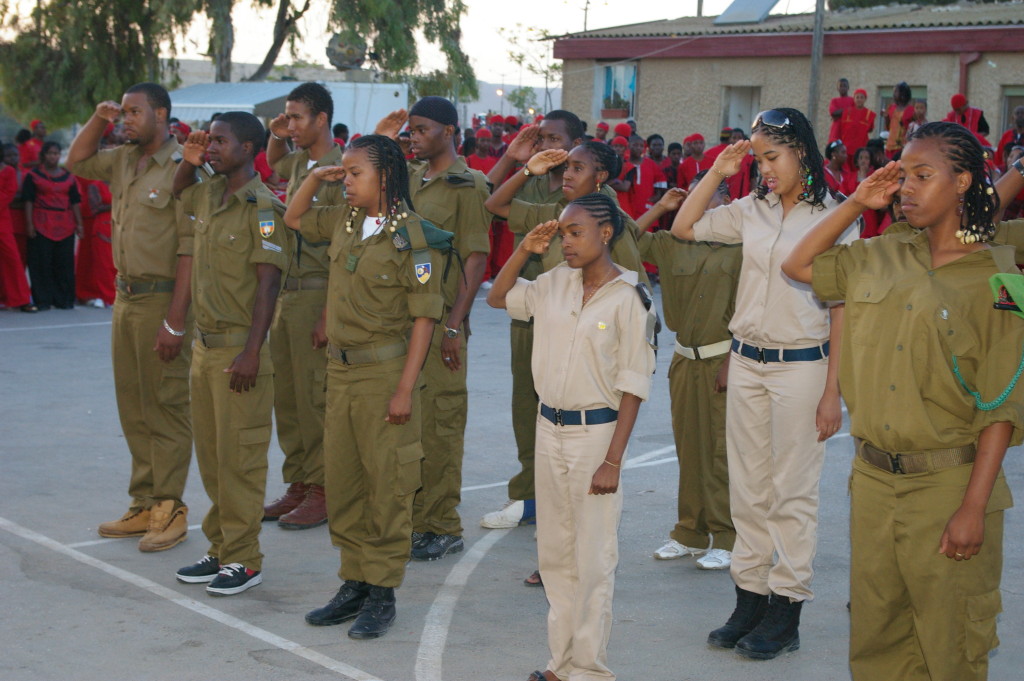
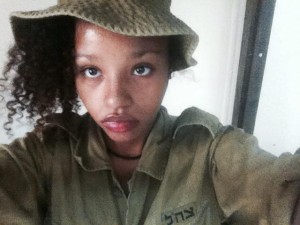

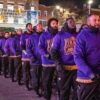
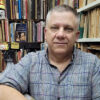
they have no objections to putting us on the front line but we are not good enough to be harried next to the other soldier?? Really?? And they wonder why the whole world hates Jews and Israelis. You claim to be the chosen people but most of you behave like stuck up “hollier than Thow” pricks. I don’t know which God these so called “Jews” thinks they are serving but it ain’t the God of Israel, Abraham Isack and Jacob because we are all gods children and he loves us all the same (flaws and all) The rapist and murderes, thieves and criminals (judgment is set in the earth so we all pay for are sins but he lives us non the less). But small minds can’t even comprehend what that even means because they continue to “humanize” God.
Sick of being politically correct. It’s 2015 gad dammit and it’s about time a big change happens!! Like yesterday!
Todah for sharing your thoughts, though I object to your characterization of “most” Jews as “holier than thou pricks.” That’s an unfair generalization. Did you serve in the IDF? If so, are you willing to share about your experience?
Point of correction, the Jews are the chosen people the Bible said. So, before you mix up with them, should be aware that certain Hebrew way of of life is different, and must be respected. Not viewed as racism.
The whole world should understand that Isreal is fighting for its life, its existence, being too tiny country and surrounded by mad people. The only chance of survival is to have a very strong army and leaders. IDF must be tough army not for crying babies!!!
The “Jews”, the ones that currently control Israel, the religious sect, are NOT the chosen people. Either way when the chosen people refused Yah the chosen people were extended to include the gentiles. Therefor all who chose the path of Yah are considered in the fold of the chosen. Israel is fighting for power and thru the many years of fighting they have not learned much. There fore if Israel does not change its ways, it will fall. The foolishness that human hold in their heart is what causes nations to fall. The Hebrews will rise……
Yes I did. And yes I would be more than willing. I think it sabout time we all speak out
I did not serve in the army but all three of my brothers did. I am no longer living in Israel but I grew up there, if I was two years younger I would have been required to serve in the military and I am so happy that I wasn’t two years younger. Here are is what I know, I have traveled to my share of different countries and I have met Jewish people in most of them and yes I think it is wrong to say that they are all the same because they are not some are good some are bad. How ever growing up in Israel with Israelis was a diffrent experience we as a people experienced so much racism, I watched my father and mother humiliated and disrespected even spat on and kicked etc by Israelis and there children. I grew up fighting racism every single day. Time has changed since I was a there and now things seem to be a bit lighter racism wise for the youth that is. But the youth are not running the country and as a society I feel they haven’t changed much. It doesn’t matter any more that we as a community should have never agreed to be in the military as it goes against our core beliefs which is peace what’s done is done. What’s important now is that our brothers and sons are now there fighting everyday and we deserve the same respect as they would give any other Israeli souldier. There lying about what happen too toveet and they will more than likely get away with it. I think there has been enough speaking and now it’s time for actions. My heart goes out to her family may she rest in peace.
No one gets away Taveeyah.